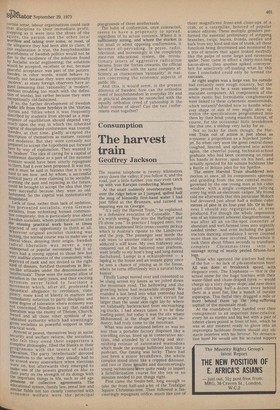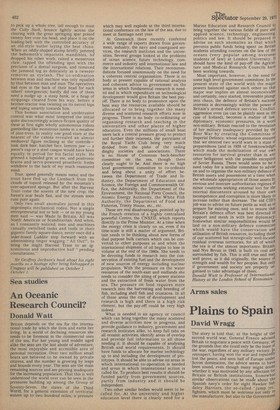Consumption
The harvest train
Geoffrey Jackson
The nearest telephone is twenty kilometres away down the valley; if you follow it, and the road, just a little further, you may even catch up with von Karajan conducting Mozart.
At the snarl suddenly reverberating from over the ridge below us I jumped, spilled half the mug of blessedly first-hand water I had just filled at the Brunnen, and turned an inquiring eye on Georgie.
Its only the Harvest Train," he explained in a defensive evocation of Constable. "But it's worth seeing. Hop into the Haflinger and I'll show you." In practice I hopped onto, not into, the snubnosed little cross-country pickup which is Austria's riposte to the Landrover and the jeep. The passenger seat inside the cab went to another visitor who smoothly adduced a stiff knee. My own foldaway seat, conjured out of the battered rear platform, went briefly to my host's long and long-haired dachshund. Lumpi is a schizophrene — a
lapdog in the house and an instant gipsy once he sees a chance of joining us in the forest, where he turns effortlessly into a natural-born hunter.
Finally Lumpi moved over and consented to be slung across my knees as we jolted down the mountain road. The bellowing and the growling below had meanwhile stopped. We rounded a last bend into what yesterday had been an empty clearing, a vast circuit far larger than the usual skin-tight lay-by where we habitually backtracked from encroaching log-trucks. I had always taken it to be their loading-point; but today it was the site where Mohammed, in the shape of large-scale industry, had truly come to the mountain.
What was now stationed before us was no less than a portable factory disposed like a travelling circus, lined up in consecutive sec tions, and attended by a circling and skirmishing retinue of automated mastodons which made the average bulldozer look like a pushcart. Our timing was lucky. There had just been a minor breakdown, the whole complex stood silent like a crippled dinosaur, and two or three amiable and disconcertingly young technicians ere quite ready to impart a familiarisation course for the ten or so minutes needed to put things right.
First came the feeder-belt, long enough to take the front half-and-a-bit of the Trafalgar Square Christmas-tree. Then followed a fascinatingly repugnant orifice, much like one of those magnificent front-end close-ups of a crab, or a caterpillar, beloved of popular science editions. These multiple grinders performed the essential preliminary of stripping branches, twigs, leaves, fronds, needles and bark from any kind and size of trunk, all these functions being determined and monitored by a trio of sensors that again looked morbidly like the pains of some large and ravenous spider. Next came in effect a thirty-foot-long bacon-sliver, then another spiked conveyor. belt for selectively off-loading what by this time I concluded could only be termed the carcases.
At right angles was a large van. Its outside had certainly seen rough country, but the inside proved to be a neat assembly of immaculate computers. All components of the whole rustic but formidable conglomerate were linked to these cybernetic masterminds, which instantly decided how to handle whatever shape or size of tree might show up, within the specifications programmed into them by their brisk young masters. Except, of course, for the occasional little breakdown like this one, a mishap very lucky for us.
Not so lucky for them though; the Harvest Train out of action is just about as economic a proposition as a hijacked jumbojet. So when very soon the great central diesel coughed, heaved, and spluttered into action again, the cheerful young technical-school graduate who had been ciceroning us raised his hands in horror, spun on his heel, and actually sprinted for his outsize bulldozer like a Battle of Britain pilot for his Spitfire.
The entire Harvest Train shuddered into motion at once, all its components spinning and grinding from the one central motor, governed by the one young man at his cabin window, with a single companion tallying every log with an electronic caliper. My friend told me afterwards that this particular Moloch had devoured just about half a million cubic metres of pine in its four-year life. Or in fairness I should say regurgitated, or even produced. For though the whole impression was of an itinerant arboreal slaughterhouse, it was after all an on-the-spot converter of abundant and well-farmed trees into urgently needed timber. And even including the giant
tractors dancing attendance I never counted
more than six men involved. Meanwhile it took them about fifteen seconds to transform complete Christmas-trees into a sausage string of neatly peeled fifteen-foot logs. .
Those who operated the tractors had most of the fun — no lack of job-satisfaction here!
All was done at breakneck speed, with elegance even. The Elephants — this is the actual name for the huge tractors with their water-filled and chain-draped tyres — would charge up a sixty degree slope, and ease down again clutching half-a-dozen trees behind them in a steel fist, like a bunch of outsize asparagus. This fistful they dragged a mile or more behind them up the long-suffering asphalt of the mountain road.
At the roundabout they handed over their consignment to an impatient near-relative, every bit as nimble and big but with a pair of lobster-claws poised in front of him, which he was at any moment ready to glove into an impromptu bulldozer fitment should any obstacle interfere with his fervour. No demarcation here! He would use his serrated nippers
to pick up a whole tree, tall enough to most the Catty Sark, bounce lightly across the clearing with the great springing spar poised twenty feet over his head, and place it on the loading-belt with the controlled accuracy of an old-style butler laying the best china. When an oddly-shaped stump briefly jammed, the behemoth's impatient mandibles, he dropped his other work, raised a monstrous claw, tapped the offending spot with the precision of a dental surgeon, and removed the jammed log as delicately as a tweezer removes an eyelash. The co-ordination between man and machine was only equalled by that between man and man. The operatives had eyes in the back of their head for each others' emergencies; hardly did one of them need a nudge up a steep bank, or a heap of strippings cleared from his way, before a brother-tractor was twisting on its swivel hips and loping smartly towards him.
This human association and unobtrusive control was what most tempered the initial quite disconcertingly science-fiction quality of these at first sight wholly autonomous robots gambolling like monstrous lambs in a meadow of pine-trees. In reality one good stare at the nearest of the cabins revealed an almost mediaeval figure reclining at the controls— lank dark hair, hatchet face, lantern jaw — a jester's cap or a steel casque would have been equally in period for his facial style. He grinned a lopsided grin at me, and positronic brains and servo-powered prosthetic limbs withdrew to the back of my much reassured mind.
True, speed generally means mess; and the trout have fled up the Lienbach from the clouds of topsoil released by the mountain's over-squeezed sponge. But after the Harvest Train come the sowers of the neW crop; the forest's scar heals fast, and the stream soon runs pure again.
Only two small anomalies jarred in this impromptu mechanical rodeo. Not a single entrepreneurial nut or bolt — or so my young men said — was Made In Britain. All was North American or Scandinavian. And when, as I constantly noticed, men and machines casually switched tasks and tools in their gigantic family square-dance, never once did a leder-hosed Luddite step forward with an admonishing finger wagging " Al] Out", to bring the might Harvest Train to an ignominious and unproductive half '` pending consultations."
Sir Oeoffrey Jackson's book about his eight months as a hostage after being kidnapped in Uruguay will be published on October I. October I.











































 Previous page
Previous page